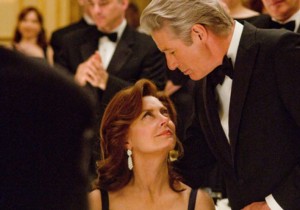
The San Sebastian Film Festival got off to a cracking start on Friday with US film Arbitrage, starring Richard Gere, Susan Sarandon and Tim Roth and directed by Nicholas Jarecki. Opening the event’s 60th edition, Jarecki’s film is competing in this year’s Official Section.
Arbitrage is a tense thriller, set against a corporate backdrop, with a tight script and an energetic pace that is largely down to script writer and debutant director Jarecki.
Gere plays Robert Miller, a business magnate who is ready to sell up, supposedly to spend more time with his family. At first he looks as if he has it all: a loving wife (an excellent if little-seen Sarandon), a devoted son and a brilliant daughter who is also his business partner.
It is when Robert leaves his 60th birthday party to visit his mistress that you realise something is amiss in paradise. Not only that: It soon becomes clear that Miller has been a naughty boy, and his shenanigans with his French art dealer-lover barely even cover it.
Admittedly, the plot of Jarecki’s film is one that’s been seen in a number of similar thrillers, with a set-up reminiscent of Woody Allen’s recent, darker material, such as Matchpoint, though the comparison ends there.
Arbitrage avoids cliché thanks to some excellent performances, intelligent, multi-layered dialogue, not to mention a storyline involving corporate fraud that is enormously relevant to the current climate.
Aside from cheating on his wife, Miller has also been cooking the books. The reason: to fool auditors and cover up a disastrous investment that could potentially lose him everything. When he later flees the scene of a fatal car accident, he is forced to dodge not only the taxman but also a police investigation, headed by a slightly caricatured, but extremely watchable Tim Roth.
In one scene, Miller’s friend Syd tells him “they will come for you, Robert.” From that moment on, the sense of a man juggling white lies and cover-ups while simultaneously and even expertly dodging the law is evoked with fantastic tension.
On one level, the film could be described as a metaphor for the current economic situation. When Miller’s young friend (played by Nate Parker) looks about to take the fall for helping to cover the older man’s much more serious crime, there are obvious parallels with the injustices of the ongoing global crisis.
In this way, Arbitrage clearly intends to pose some uncomfortable questions about the apparent impunity of the rich and powerful who have helped bring our economy to its knees. But if the film works so well it is ultimately because it is not about heroes and villains. Here, the audience is asked to identify, even empathise, with well-drawn, three-dimensional characters, all of whom are flawed in various ways.
In the conference following the press screening, Jarecki and Gere said they worked on Miller’s walk to, in Gere’s words “find the charm, the Bill Clinton, in the character”’. He pulls it off with aplomb. Gere is not only likeable in this film, he is undeniably sexy and I often felt torn between hoping he would get away with it, and wishing he would get his just desserts.
Meanwhile…
Also showing on Friday were two films in the Festival’s Horizontes Latinos section: Infancia Clandestina (Clandestine Childhood), starring Ernesto Alterio, and Salsipuedes, about domestic violence, both from Argentina.
Also showing as part of the Zabaltegi Pearls section was Michael Haneke’s Amour, which took the Golden Palm at Cannes.
This year’s Donostia Award (which went to Richard Gere in 2007) will be awarded to four people, all of whom are presenting films this year:
Ewan McGregor will present The Impossible, a film from Spanish director J.A Bayona about the 2007 tsunami, competing in the Official Section.
Dustin Hoffmann presents Quartet, a British film he directed that will not compete in any section.
John Travolta and Oliver Stone both present Savages, which competes in the Zabaltegi Pearls Section.
I forgot mention Tommy Lee Jones, who also gets a special 60th anniversary award.